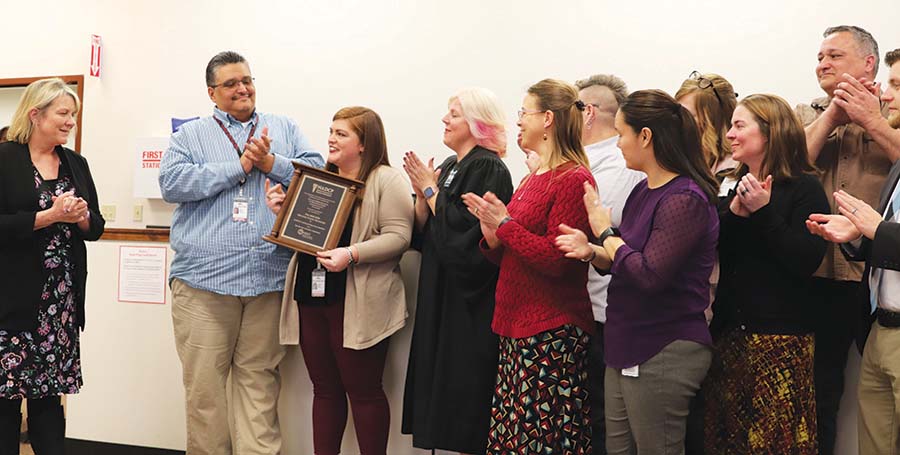
By Kalvin Valdillez, Tulalip News
At the start of 2017, the Tulalip Tribes and the Tulalip Justice Department introduced a new system to address the drug epidemic that was overtaking the entire nation at the time and claiming many lives of Indigenous people all across Native America. For a point of reference, that year over 70,000 deaths resulted from heroin, fentanyl or opioid overdose in the United States alone, according to the Centers for Disease Control (CDC). The number of overdose related deaths did decrease, however, dropping to a recorded 67,000 deaths in 2018. Which is still alarmingly high.
In an effort to help guide those wishing to get clean and escape the battle of addiction, as well as set them on the road to recovery, the Tribe took a chance by tailoring the standard state drug court to the needs of their Tribal people when developing the Healing to Wellness Court. This new approach originally drew skepticism from the community, perhaps due to failed drug court experiences in the past. But fast forward three years and the program has two prominent graduates who are actively inspiring from within the tribal society, and over twenty participants who have anywhere from a week to hundreds of days free from the grip of their addictions, as the program takes about 18-24 months to complete depending on the individual’s personal journey.
The wellness court has often been attributed by many of its participants as a ‘lifesaver’. Dozens have shared about the healing they receive during local gatherings like the monthly Wellbriety celebration dinners sponsored the Tulalip Problem Gambling program, or at weekly meetings, cultural events and during ‘give back’ hours while working at the smokehouse or with the Tribal elders. Most importantly, wellness court creates a community-like environment amongst its participants, and in many ways a support system where the people hold each other accountable and offer encouragement and support while working on their own sobriety.
Although their focus is the people of Tulalip, word about the work the wellness court is conducting has spread nationwide. On the afternoon of February 25, an official from the National Drug Court Institute, Karen Cowgill, flew across the country to hand-deliver a plaque recognizing the wellness court for their effective system.
“The award we received today was the National Association of Drug Court Professionals (NADCP) Mentor Court,” stated Interim Wellness Court Program Manager, Ashley Utz-Cook. “We were awarded to be a part of the Mentor Court Network, which means under the NADCP they’ve deemed us as one of the best of the best. So far, we are one of two tribal courts in the network and I believe there are nine other courts in the network.”
As an added bonus, Karen witnessed firsthand the inner-workings of wellness court. Such as how the judge interacts with the participants; how those who are in compliance are recognized for their accomplishments and challenged to continue striving forward. And those who aren’t in compliance are still offered encouragement in addition to a stern talking-to and the appropriate sanctions.
“I came out today because the Healing to Wellness Court applied to become a mentor court,” said Karen. “For the next two years, when we have courts that are learning how to be a tribal drug court, we can send them here and they can observe the judge and meet the team and talk to them and actually see what this all about. This [system] is really going to be an example across the United States for tribal courts to see how to do the job. It’s a different way of doing drug court; we can help get people back on track and make sure they succeed in the long run.”
The wellness court has done a great job of turning the perception of their system around, so much so that drug court teams will be flying in from all around the nation to see the healing aspect of drug court take place in real life.
“It feels awesome,” expressed Ashley after her team received the award. “It was a lot of work put in by every single team member, as well as the people before us and of course the participants. It feels great to see everything we do every day, the daily operations, recognized on such a high scale. We appreciate everyone’s hard work from the staff to the participants.”
Before concluding wellness court and the award celebration, the court team decided to pay it forward by extending love and recognition to a Tribal member who dedicated her life to assisting recovering addicts. Helen Gobin-Henson was gifted with a certificate of appreciation for the support and guidance she offers to the local recovery community.
“This means so much to me because this is my calling,” Helen said with tears running down her cheek. “I’ve been doing this work for about thirty years, helping my people get into treatment and doing whatever I can. I sung for all the funerals for over fifty years and it really hits me hard when we lose our young ones, even our old ones, to this addiction, to this disease. I hope that I can be a blessing to my people and show them that recovery works if you work it.”
For additional details about the Healing to Wellness Court, please contact (360) 716-4773.